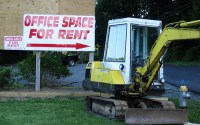December 31, 2013
Can My Landlord Evict My Business Without Going to Court First? – Part I
Part I – Landlord Self Help in Virginia
Suppose a company leases commercial property to run its business. Due to economic conditions, the tenant struggles to pay rent. The landlord has declared the tenant in default, or is threatening to do so. One of the remedies asserted by the landlord is “self-help” such as changing the locks and removing the business’ property from the premises. Can the landlord do that? What strategies and considerations are available to the tenant in such a situation?
When a tenant of a commercial property falls into default under the lease, or such default is imminent, knowing what options the landlord has moving forward is essential. The tenant making present use of the leased premises needs to know the landlord’s potential legal remedies so it can craft its own plan for the immediate future and to provide a framework for negotiations. In Virginia, and other jurisdictions where landlord self-help is permitted, threats such as changing the locks or otherwise barring the tenant from re-entry, removal of the property from the premises and placing it elsewhere may be the most urgent concern to a struggling commercial tenant. Understanding the respective rights of the landlord and tenant are crucial to planning continuity of business operations and safeguarding company property.
In Virginia, a landlord in a residential lease has no right of self-help eviction. However, the right of self-help remains an option for non-residential leaseholds. The commercial landlord is limited to using reasonable force in taking possession of the property upon default. The landlord may not “Breach the Peace” in taking possession. In other words, confrontation threatening physical harm is not permitted. Self-help may be attractive to the landlord in order to make an urgent transition to a new tenant without having to go to Court, take the case to trial and have the sheriff come out to the property.
While the remedy of self-help is legal in Virginia in non-residential matters, there are several considerations that make landlords reluctant to pursue it. In Part II, I will discuss several reasons why landlords usually avoid trying self-help eviction.
December 27, 2013
Client Relationships for the Custom Home Builder in 2014
In the past year or so, demand outpaced supply in the Northern Virginia real estate market. Many home builders and tradesmen went out of business in 2008-2009, creating a shortage of home builders. For home buyers, a custom home offers the prospect of owning a made-to-order dream home. For the builder, the custom home business brings rewards as well. These include the pricing of a premium product and working closely with buyers to help them fulfill their dreams. These dreams bear the legal complexity of contracting for the sale of something that does not yet exist. For the buyer, this is the biggest consumer purchase of their life. They rightly take pride of ownership in the project. This blog post identifies a few key issues from the perspective of the custom builder for the New Year:
- Liability Shield. You stand behind your work and want to keep your customers happy. This is how business grows. At the same time, you owe it to yourself and your family to protect your personal assets and credit. Customers expect that they will be doing business with a company. By incorporating or forming an LLC prior to making contracts, custom builders can exercise reasonable control of the exposure of their own credit and assets. Communications and agreements with customers should clarify the seller’s identity.
- Choosing the Customer. Prospective customers are likely talking to other builders or realtors. If a prospect reminds you too much of a previous problem customer, she may not be a good fit for your business. The wrong customer may distract you away from your more deserving customers and prospects. Consult with legal counsel if anti-discrimination or fair credit laws may apply.
- Written Agreements. Use an attorney-prepared written contract prepared for the particular type of project and state law. It may not be necessary to have a “new” form for each job. However, a realtor form for the sale of homes in Maryland won’t work well for a custom home in Virginia.
- Customer Service. Always have someone available to handle customer inquiries, at least during normal business hours. Buyers of custom homes tend to visit the site frequently and have questions. They feel a tremendous amount of financial and emotional investment in the project.
- Project Control. Don’t allow the consumer to directly supervise your subcontractors on the job site. An excited buyer may want to go outside his contract with you and hire his own tradesman to install items on property they don’t yet own. No car dealer would allow a shopper to take an auto to a body shop for a custom paint job during an extended test drive. The custom home builders do themselves and the customer a favor by anointing a manager or site supervisor to “face” with the client.
- Happy Endings. Take walk through inspections, punch lists and closings as an opportunity to communicate with the buyer and wrap things up effectively.
Home builders unfairly have a reputation for being unresponsive or inflexible with their customers. More often, custom builders struggle with being too accommodating with the demands of buyers. Most of all, custom home buyers expect the builder to provide them with personal leadership and advice. Attention to the legal aspects of your customer relationships is a critical element of entrepreneurial creativity and leadership.
December 23, 2013
Navigating the Walk Through Part II – Inspection Contingencies in Real Estate Contracts
Check Your Contract for Your Inspection Rights & Duties:
Many real estate contracts impose a right or duty to inspect and approve the development of a property before going to closing. Many contracts for custom homes or commercial developments contemplate that the parties will walk through the property prior to consummating the purchase. If you have a right under a contract, failure to exercise that right may potentially waive a future claim for a defect that reasonable exercise of the right of inspection would have discovered.
If the contract provision discusses preparation of a punch-list or inspection report based upon the inspection, both parties are well advised to take notes (on old-fashioned pads of paper or discretely using the camera in your phone or tablet) for later use in negotiating the inspection report.
If the transaction involves loans, the bank will require an independent appraisal. A shrewd investor takes heed of a professional appraisal, but does not allow it to substitute for her own review. Appraisals usually focus on a comparative analysis of the property with other properties with similar general characteristics, and do not look at the property from the perspective of having to live or work in it on a long term basis.
Home Inspection Industry in Virginia:
Many real estate purchasers use hired professional inspectors to help spot issues during walk-throughs. Most contracts for purchase of a home advise buyers of the opportunity to seek out the counsel of various types of professionals that may aid the inspection process.
Note that in Virginia, a home inspector does not have to be board-certified to do business as one. Currently, the Commonwealth of Virginia provides home inspectors with the opportunity to certify themselves. Home inspectors not certified by the state are forbidden from holding themselves out as certified if they are not, but they may continue to lawfully market their services as a home inspector.
In the purchase of a residential property, a Virginia certified home inspector or an inspector who is a licensed Virginia contractor, is likely to possess the basic qualifications. Various professional organizations, such as the American Society of Home Inspectors, provide members with credentialing opportunities as well. Bear in mind that these professionals can only advise you of what you see and prepare a report. What actions to take based on this information is subject to negotiation between the buyer and seller.
Repair Addenda:
The home inspection process may result in a list of items that the seller agrees to fix by a certain date. When the seller informs the buyer that the repairs are complete, this shifts responsibility somewhat back to the buyer to confirm that the changes are acceptable. In the event of a dispute, the Court will likely ascribe weight to those contracts and lists signed off on by the parties.
Reality TV Home Buying vs. Preparing for a Real Future:
Today’s investors and professionals have greater access to information about real estate than ever before. Whether you are going to use the property for business, personal or public purposes, you don’t need years of specialized experience to know what to look for in a walk through – only you know what questions you need answered.
Your own goals will provide you with a starting point for preparing a walk-through checklist. The issues to focus on in the walk-through are different for each situation, but the important thing is to have a plan of what to look for based on the matters at issue. Furthermore, a walk-through will provide you with certainty and a firm basis for negotiating the outcomes desirable to your business. Your family will live with the visceral effect of entering the property every day. Make the most of your walk-through before you buy, sell or lease your investment.
December 19, 2013
Navigating the Walk Through – Part I
From the moment the first person piled up rocks or rough-hewn timber to distinguish his farmland from the neighbors’, real estate has been visually-oriented. In the business of real estate, the walk-through of the premises provides you with an eyes-wide-open basis for due diligence and negotiation in sales, leases and dispute resolution. In the age of internet videos, Smartphone photography, Google maps, engineer drawings and online public land records, it is possible to learn much about a property without actually visiting it. However, real estate professionals still swear to the value of a real walk-through when your property is going through a transition. A photograph or video recording of a property may identify a desirable asset or potential problem without the time consuming task of driving to a location and talking a look. However, any kind of recording, photograph, drawing or description is at best a useful abstract of the property at a specific moment in time. If an entrepreneur desires to lease or purchase a property for purposes of operation of a unique business activity there, it is unlikely that a set of records could illustrate whether the property can fit her creative purpose. It is difficult to communicate with another party regarding a unique property concern without looking first.
Many buyers, tenants and lenders are drawn towards relying upon the representations of other people when entering into contracts. Business relationships do need trust in order to bear fruit. However, if someone insists that you make a decision without significant investigation, slow things down. The general rule in Virginia is caveat emptor –let the buyer beware. The law expects folks to be reasonably wary when it comes to entering into contracts. Further, once a party begins to conduct an investigation of matters underlying a contractual decision, the burden is on him or her to complete that investigation to the extent warranted by the situation. Of course, if the other party knowingly conceals a problem with real estate, the purchaser may have a basis to void the contract. After the fact, the burden of proving any kind of deceit would fall on the party suffering the harm. Generally speaking, the law expects parties entering into real estate contracts to do so reasonably self-informed about the subject property and the terms of the contract itself.
Part II of this post will explore the inspection process in more detail.




